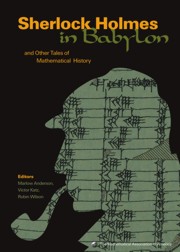Book contents
- Frontmatter
- Introduction
- Contents
- Ancient Mathematics
- Foreword
- Sherlock Holmes in Babylon
- Words and Pictures: New Light on Plimpton 322
- Mathematics, 600 B.C.–600 A.D.
- Diophantus of Alexandria
- Hypatia of Alexandria
- Hypatia and Her Mathematics
- The Evolution of Mathematics in Ancient China
- Liu Hui and the First Golden Age of Chinese Mathematics
- Number Systems of the North American Indians
- The Number System of the Mayas
- Before The Conquest
- Afterword
- Medieval and Renaissance Mathematics
- The Seventeenth Century
- The Eighteenth Century
- Index
- About the Editors
Foreword
from Ancient Mathematics
- Frontmatter
- Introduction
- Contents
- Ancient Mathematics
- Foreword
- Sherlock Holmes in Babylon
- Words and Pictures: New Light on Plimpton 322
- Mathematics, 600 B.C.–600 A.D.
- Diophantus of Alexandria
- Hypatia of Alexandria
- Hypatia and Her Mathematics
- The Evolution of Mathematics in Ancient China
- Liu Hui and the First Golden Age of Chinese Mathematics
- Number Systems of the North American Indians
- The Number System of the Mayas
- Before The Conquest
- Afterword
- Medieval and Renaissance Mathematics
- The Seventeenth Century
- The Eighteenth Century
- Index
- About the Editors
Summary
The twentieth century saw great strides in our understanding of the mathematics of ancient times. This was often achieved through the combined work of archaeologists, philologists, and historians of mathematics.
We especially see how this understanding has grown in the study of the mathematics of Mesopotamia. Although the clay tablets on which this mathematics was written were excavated beginning in the nineteenth century, it was not until early in the twentieth century that a careful study of the mathematics on some of these tablets was undertaken. In particular, the tablet known as Plimpton 322 was first published by Neugebauer and Sachs in 1945, whodetermined that the numbers in each row of the tablet always included two out of the three numbers of a Pythagorean triple. Since that time, there has been a great scholarly debate on how those numbers were found, as well a the general purpose of the tablet. In our opening papers, we present two discussions of this issue, one by R. Creighton Buck and a second by Eleanor Robson. Both of these papers illustrate the necessity of applying ideas from several disciplines to help us make sense of the past.
Greek mathematics has, of course, been studied ever since the demise of Greek civilization. A survey of the history of Greek mathematics, as it was understood in the 1940s, is presented here by Max Dehn, a prominent mathematician in his own right—he solved one of the Hilbert problems. Dehn's article originally appeared in four parts in the Monthly, each part dealing with a different chronological period.
- Type
- Chapter
- Information
- Sherlock Holmes in BabylonAnd Other Tales of Mathematical History, pp. 3 - 4Publisher: Mathematical Association of AmericaPrint publication year: 2003



